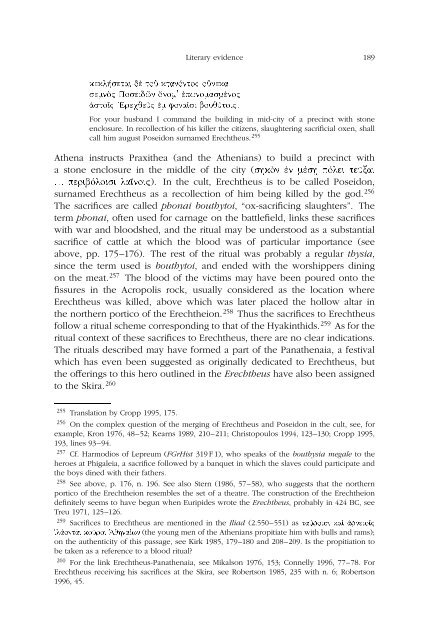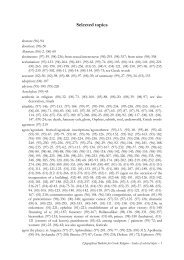The sacrificial rituals of Greek hero cults in the Archaic to the early ...
The sacrificial rituals of Greek hero cults in the Archaic to the early ...
The sacrificial rituals of Greek hero cults in the Archaic to the early ...
Create successful ePaper yourself
Turn your PDF publications into a flip-book with our unique Google optimized e-Paper software.
Literary evidence 189<br />
keklåsetaidè<strong>to</strong>ûktanón<strong>to</strong>voºneka<br />
semnòvPoseid÷nÌnom Çpwnomasménov<br />
s<strong>to</strong>îv>EreqjeùvÇmfonaîsiboujú<strong>to</strong>iv.<br />
For your husband I command <strong>the</strong> build<strong>in</strong>g <strong>in</strong> mid-city <strong>of</strong> a prec<strong>in</strong>ct with s<strong>to</strong>ne<br />
enclosure. In recollection <strong>of</strong> his killer <strong>the</strong> citizens, slaughter<strong>in</strong>g <strong>sacrificial</strong> oxen, shall<br />
call him august Poseidon surnamed Erech<strong>the</strong>us. 255<br />
A<strong>the</strong>na <strong>in</strong>structs Praxi<strong>the</strong>a (and <strong>the</strong> A<strong>the</strong>nians) <strong>to</strong> build a prec<strong>in</strong>ct with<br />
a s<strong>to</strong>ne enclosure <strong>in</strong> <strong>the</strong> middle <strong>of</strong> <strong>the</strong> city<br />
... peribóloisi<br />
(shkòn Çn mésþ pólei teûxai<br />
la·noiv). In <strong>the</strong> cult, Erech<strong>the</strong>us is <strong>to</strong> be called Poseidon,<br />
surnamed Erech<strong>the</strong>us as a recollection <strong>of</strong> him be<strong>in</strong>g killed by <strong>the</strong> god. 256<br />
<strong>The</strong> sacrifices are called phonai bouthy<strong>to</strong>i, “ox-sacrific<strong>in</strong>g slaughters”. <strong>The</strong><br />
term phonai, <strong>of</strong>ten used for carnage on <strong>the</strong> battlefield, l<strong>in</strong>ks <strong>the</strong>se sacrifices<br />
with war and bloodshed, and <strong>the</strong> ritual may be unders<strong>to</strong>od as a substantial<br />
sacrifice <strong>of</strong> cattle at which <strong>the</strong> blood was <strong>of</strong> particular importance (see<br />
above, pp. 175–176). <strong>The</strong> rest <strong>of</strong> <strong>the</strong> ritual was probably a regular thysia,<br />
s<strong>in</strong>ce <strong>the</strong> term used is bouthy<strong>to</strong>i, and ended with <strong>the</strong> worshippers d<strong>in</strong><strong>in</strong>g<br />
on <strong>the</strong> meat. 257 <strong>The</strong> blood <strong>of</strong> <strong>the</strong> victims may have been poured on<strong>to</strong> <strong>the</strong><br />
fissures <strong>in</strong> <strong>the</strong> Acropolis rock, usually considered as <strong>the</strong> location where<br />
Erech<strong>the</strong>us was killed, above which was later placed <strong>the</strong> hollow altar <strong>in</strong><br />
<strong>the</strong> nor<strong>the</strong>rn portico <strong>of</strong> <strong>the</strong> Erech<strong>the</strong>ion. 258 Thus <strong>the</strong> sacrifices <strong>to</strong> Erech<strong>the</strong>us<br />
follow a ritual scheme correspond<strong>in</strong>g <strong>to</strong> that <strong>of</strong> <strong>the</strong> Hyak<strong>in</strong>thids. 259 As for <strong>the</strong><br />
ritual context <strong>of</strong> <strong>the</strong>se sacrifices <strong>to</strong> Erech<strong>the</strong>us, <strong>the</strong>re are no clear <strong>in</strong>dications.<br />
<strong>The</strong> <strong>rituals</strong> described may have formed a part <strong>of</strong> <strong>the</strong> Pana<strong>the</strong>naia, a festival<br />
which has even been suggested as orig<strong>in</strong>ally dedicated <strong>to</strong> Erech<strong>the</strong>us, but<br />
<strong>the</strong> o�fer<strong>in</strong>gs <strong>to</strong> this <strong>hero</strong> outl<strong>in</strong>ed <strong>in</strong> <strong>the</strong> Erech<strong>the</strong>us have also been assigned<br />
<strong>to</strong> <strong>the</strong> Skira. 260<br />
255 Translation by Cropp 1995, 175.<br />
256 On <strong>the</strong> complex question <strong>of</strong> <strong>the</strong> merg<strong>in</strong>g <strong>of</strong> Erech<strong>the</strong>us and Poseidon <strong>in</strong> <strong>the</strong> cult, see, for<br />
example, Kron 1976, 48–52; Kearns 1989, 210–211; Chris<strong>to</strong>poulos 1994, 123–130; Cropp 1995,<br />
193, l<strong>in</strong>es 93–94.<br />
257 Cf. Harmodios <strong>of</strong> Lepreum (FGrHist 319 F 1), who speaks <strong>of</strong> <strong>the</strong> bouthysia megale <strong>to</strong> <strong>the</strong><br />
<strong>hero</strong>es at Phigaleia, a sacrifice followed by a banquet <strong>in</strong> which <strong>the</strong> slaves could participate and<br />
<strong>the</strong> boys d<strong>in</strong>ed with <strong>the</strong>ir fa<strong>the</strong>rs.<br />
258 See above, p. 176, n. 196. See also Stern (1986, 57–58), who suggests that <strong>the</strong> nor<strong>the</strong>rn<br />
portico <strong>of</strong> <strong>the</strong> Erech<strong>the</strong>ion resembles <strong>the</strong> set <strong>of</strong> a <strong>the</strong>atre. <strong>The</strong> construction <strong>of</strong> <strong>the</strong> Erech<strong>the</strong>ion<br />
def<strong>in</strong>itely seems <strong>to</strong> have begun when Euripides wrote <strong>the</strong> Erech<strong>the</strong>us, probably <strong>in</strong> 424 BC, see<br />
Treu 1971, 125–126.<br />
259 Sacrifices <strong>to</strong> Erech<strong>the</strong>us are mentioned <strong>in</strong> <strong>the</strong> Iliad (2.550–551) astaúroisikaì rneioîv<br />
°láontaikoûroi>Ajhnaíwn (<strong>the</strong> young men <strong>of</strong> <strong>the</strong> A<strong>the</strong>nians propitiate him with bulls and rams);<br />
on <strong>the</strong> au<strong>the</strong>nticity <strong>of</strong> this passage, see Kirk 1985, 179–180 and 208–209. Is <strong>the</strong> propitiation <strong>to</strong><br />
be taken as a reference <strong>to</strong> a blood ritual?<br />
260 For <strong>the</strong> l<strong>in</strong>k Erech<strong>the</strong>us-Pana<strong>the</strong>naia, see Mikalson 1976, 153; Connelly 1996, 77–78. For<br />
Erech<strong>the</strong>us receiv<strong>in</strong>g his sacrifices at <strong>the</strong> Skira, see Robertson 1985, 235 with n. 6; Robertson<br />
1996, 45.



